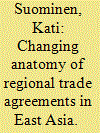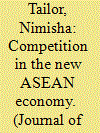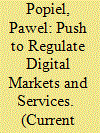|
|
|
Sort Order |
|
|
|
Items / Page
|
|
|
|
|
|
|
| Srl | Item |
| 1 |
ID:
086135


|
|
|
|
|
| Publication |
2009.
|
| Summary/Abstract |
The recent proliferation of regional trade agreements in the East Asian region can be seen as the most notable development in the region's trading panorama in recent years. Yet, very little is as yet understood about the anatomy of these agreements and, consequently, their full implications to the regional economy. This article strives to fill this gap by analyzing the structure of four dozen RTAs by their various key component parts, including tariff liberalization schedules, rules of origin, and competition policy, customs, investment, and services provisions. The results reveal that intra-Asian RTAs are generally quite rapidly liberalizing, with the exception of agriculture, but they are also quite thin in trade-related disciplines when compared with the more legalistic US trans-Pacific RTAs and those of Mexico and Chile. The proposed Free Trade Area of the Asia-Pacific would inherently be a construct of the political economy interests of these various constituent RTAs.
|
|
|
|
|
|
|
|
|
|
|
|
|
|
|
|
| 2 |
ID:
176208


|
|
|
| 3 |
ID:
153315


|
|
|
|
|
| Summary/Abstract |
This article examines how contestable market theory (contestability) has come to reconfigure the economic and regulatory concept of competition in order to enhance the compatibility of Australia’s economy with international trade and investment agreements. Australia has recently negotiated and signed a raft of bilateral, plurilateral and regional agreements, including the Trans-Pacific Partnership Agreement and the Australia–China Free Trade Agreement. In order to ensure that Australia meets its obligations and commitments to these agreements, two key advisory bodies—the Harper Panel on Competition Policy Review and the Financial System Inquiry—made recommendations, the majority of which were accepted by the government, to ready Australia’s competition governance and economic policy for greater global integration. Such impact is dependent on, among other things, how domestic competition policy meshes with the free market ideology underpinning such international agreements, which favours the breakdown of barriers to markets. Less well known is the role of contestability in radicalising ideology as it countenances monopolisation and privatisation in the guise of market access by justifying the substitution of actual competition with the mere threat of competition. The article concludes that the monopoly power of transnational corporations will be enhanced through the acquiescence of governments to the new governance regime of the Trans-Pacific Partnership Agreement, which, supported by domestic policy, is set to redraw competition policy in the light of contestability theory.
|
|
|
|
|
|
|
|
|
|
|
|
|
|
|
|
| 4 |
ID:
176662


|
|
|
|
|
| Summary/Abstract |
Despite the relatively large number of gas stations reached in Spain after decades of sectorial reforms, pre-tax fuel prices in the country remain systematically among the highest in the EU. The literature provides evidence suggesting that a low intensity of competition in the retail distribution could contribute to these casual observations. With the purpose of shedding light on ways to design effective competition measures, we conduct an empirical analysis of more than ten million observations containing information about prices, brands, and locations at the station level. This allows us to know whether the exit (entry) of some classes of stations have the ability to reduce the prices of nearby competitors. Our results suggest that the presence in a local market of a station belonging to the network of the dominant market companies will tend to generate prices above the average. This is not only because these stations set higher prices but also because their presence will give rise to overpricing by local competitors. The opposite occurs with the self-advertised as “low-cost” stations. Policy measures promoting the gradual exit of stations associated with the dominant companies seem quite reasonable in view of the commitment to the transition toward transport decarbonization.
|
|
|
|
|
|
|
|
|
|
|
|
|
|
|
|
| 5 |
ID:
092797


|
|
|
|
|
| Publication |
2009.
|
| Summary/Abstract |
Long-term supply contracts often have ambiguous effects on the competitive structure, investment and consumer welfare in the long term. In the new market context, these effects are likely to be worsened and thus even harder to assess. Since liberalization and especially since the release of the Energy Sector Inquiry in early 2007, the portfolio of long-term supply contracts of the former incumbents have become a priority for review by the European Commission and the national competition authorities. It is widely believed that European Competition authorities take a dogmatic view on these contracts and systemically emphasize the risk of foreclosure over their positive effects on investment and operation. This paper depicts the methodology that has emerged in the recent line of cases and argues that this interpretation is largely misguided. It shows that a multiple-step approach is used to reduce regulation costs and balance anti-competitive effects with potential efficiency gains. However, if an economic approach is now clearly implemented, competition policy is constrained by the procedural aspect of the legal process and the remedies imposed remain open for discussion.
|
|
|
|
|
|
|
|
|
|
|
|
|
|
|
|
| 6 |
ID:
189696


|
|
|
|
|
| Summary/Abstract |
In the past few years, efforts to regulate digital platform services have grown in analytical sophistication, acquired political momentum, and started to produce legislative and regulatory interventions. The emerging policy frameworks—which tend to focus on content, data, and market power concerns—show degrees of variation, by region and by policy domain, and reflect various normative and policy goals. This essay examines their underlying policy goals, normative commitments, and the tensions and trade-offs they present.
|
|
|
|
|
|
|
|
|
|
|
|
|
|
|
|
| 7 |
ID:
047457


|
|
|
|
|
| Publication |
Tokyo, Institute for International Policy Studies, 2000.
|
| Description |
92p.
|
|
|
|
|
|
|
|
|
|
|
|
Copies: C:1/I:0,R:0,Q:0
Circulation
| Accession# | Call# | Current Location | Status | Policy | Location |
| 043362 | 338.6048/INS 043362 | Main | On Shelf | General | |
|
|
|
|
| 8 |
ID:
071775


|
|
|
|
|
| Publication |
2006.
|
| Summary/Abstract |
This article employs a cross-level approach to explain cooperation in transatlantic competition policy. The explanation reveals the important role of regulators as interfaces between the domestic and international levels of analysis. Economic internationalization is a system-level cause of this cooperation, the precise effect of which is accounted for by an intervening variable (domestic politics), which is simplified with a principal-agent model. The negotiations over the 1991 EU-US Bilateral Competition Agreement suggest that, while regulators remain constrained by domestic institutions, they play an important role in explaining why the formal, transatlantic cooperative framework is largely a discretionary one created by a non-treaty international agreement.
|
|
|
|
|
|
|
|
|
|
|
|
|
|
|
|
|
|
|
|
|